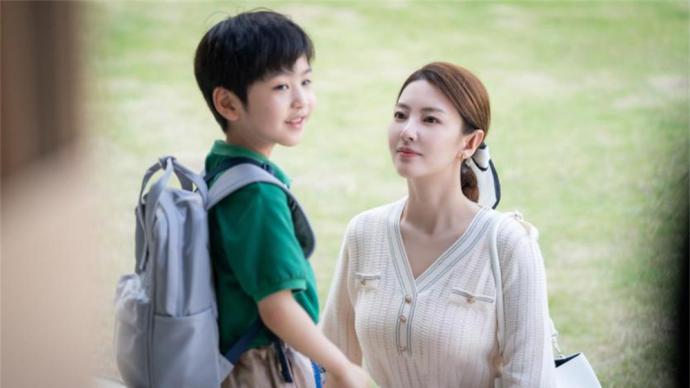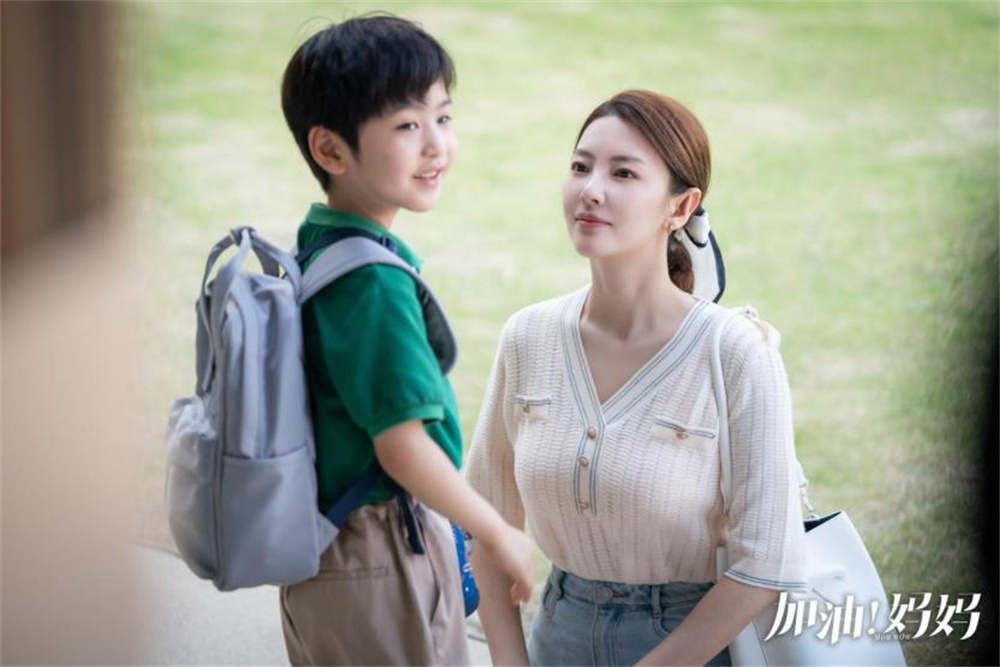
Educational TV dramas have entered a relatively dull stage from the previous era of explosions. After being bombarded by a number of educational TV dramas, the audience has gradually become familiar with the narrative paradigm of this theme. Not only China, but also South Korea and Japan in East Asian society. For example, the Korean dramas "City in the Sky" and "The Penthouse" have set ratings records, but the ratings of "High Class" and "Melancholia" after that have been lukewarm.
The differences in educational TV dramas are mainly reflected in the differences in children's educational stages. For example, "Little Joy" is in the high school stage, "Little Farewell" is in the junior high school stage, and "Little Shede" is in the elementary school stage, and this time the broadcast "Come on!" "Mom" is from young to primary, and the children are still in kindergarten. It is worth mentioning that "Come on! Mom" is a remake of the 2015 Japanese drama "Mother Game: Their Class."
One is "involution". Children roll from kindergarten to high school, and behind the children's rolls are the parents. Different TV series often present different ways of involution. "come on! "Mom" focuses more on how when a child from an ordinary family "wrongly entered" an aristocratic kindergarten, how he and his mother were "excluded" by everyone.

Most of the parents of noble kindergartens are either rich or expensive. For example, "Wu Yue" is a senior partner of a famous local law firm with a high income. "Dong Jie" used to be a nurse, her husband was a doctor with little success, and her in-laws were also quite wealthy. Although "Hai Lu" is the second poorest among many mothers in the kindergarten (the last one is "Zhang Yuqi"), but she has already understood the rules of the kindergarten - the poor will be looked down upon, so she has been slapped and made fat, She pretends to be a "rich wife" in front of her mother in the kindergarten every day, but she is actually the last one to leave the kindergarten every day - I am afraid that I will be seen by others when I take the bus with my daughter.


Another narrative feature of educational TV dramas is that they imagine and magnify the misery of the upper class, and give the middle class a spiritual massage with a reconciling ending.
Specifically, educational TV dramas are mainly from the perspective of the middle class, and the target audience is also them; so if the upper class appears in the drama (like Korean education themes are keen to portray the 1% of the Korean upper class), its bright appearance will , must be miserable; although middle-class families are also struggling with the education of their children, they must have more "superior" places than upper-class families, such as loving husband and wife relationships, smarter and kinder children, and so on.
"come on! Mom" as well. You see, "Zhang Yuqi" is a single mother. It's very hard work, but she is actually happier than many mothers. For example, her children are more independent, well-behaved, and kind. For example, the kindergarten teacher "Li Zefeng" gives her more private care, for example, her educational philosophy is more correct, and she will eventually impress other mothers in the kindergarten...

TV dramas cleverly cater to the psychology of the general public and bring a faint sense of revenge to the audience, but this kind of spiritual victory is often limited to the broadcast process of the TV series. In reality, the victory mainly belongs to who, everyone knows it Bright.
However, the problem now is: verbally anti-involution, and non-stop involution in action; those parenting concepts that agree with "Zhang Yuqi" in their mouths, but actually act like "Wu Yue" and "Dong Jie"... I can't blame the parents for being A giant in words and a dwarf in action, after all, no one dares to gamble on the future of their children. "I am for your own good" is not only a curse for children, but also a shackle for parents. As long as this contradictory mood exists, it is similar to "Come on! "Mom" TV series will continue to be produced.
As a mass cultural product, such a TV series has its own market; however, if a TV series tries to provide the ideological resources to decipher the involution, it must first have the courage to transcend the established narrative paradigm.
The differences in educational TV dramas are mainly reflected in the differences in children's educational stages. For example, "Little Joy" is in the high school stage, "Little Farewell" is in the junior high school stage, and "Little Shede" is in the elementary school stage, and this time the broadcast "Come on!" "Mom" is from young to primary, and the children are still in kindergarten. It is worth mentioning that "Come on! Mom" is a remake of the 2015 Japanese drama "Mother Game: Their Class."

"come on! Mom poster
In East Asian society deeply influenced by Confucian culture, parents pay the same high attention to their children's education. Although the education systems are different, whether it is the dog-blooded "City in the Sky", the warm and daily "Little Joy", or the "Mother" Game" "Come on! Mom, they share two things in common narratively.One is "involution". Children roll from kindergarten to high school, and behind the children's rolls are the parents. Different TV series often present different ways of involution. "come on! "Mom" focuses more on how when a child from an ordinary family "wrongly entered" an aristocratic kindergarten, how he and his mother were "excluded" by everyone.

Zhang Yuqi as a single mother
The kindergarten in the play is the best and the most expensive kindergarten in the local area. It costs 8,000 yuan a month for education alone, 780 yuan for monthly meals, plus books, school uniforms and special courses. 10,000 yuan per month. The monthly fees for kindergartens have exceeded the ability of most ordinary families in China.
Kindergarten tuition is not cheap
The heroine "Zhang Yuqi" (the play is a group play, the character name is represented by the actor's name and double quotation marks to avoid reading confusion) is an ordinary bank clerk and a single mother. Her family background is very ordinary. The opportunity to study in the best private kindergarten in the local area, "Zhang Yuqi" finally decided to tighten her belt and let her children come here to join classes, because the children who graduated this year have a great chance to enter the best private primary school in the local area.Most of the parents of noble kindergartens are either rich or expensive. For example, "Wu Yue" is a senior partner of a famous local law firm with a high income. "Dong Jie" used to be a nurse, her husband was a doctor with little success, and her in-laws were also quite wealthy. Although "Hai Lu" is the second poorest among many mothers in the kindergarten (the last one is "Zhang Yuqi"), but she has already understood the rules of the kindergarten - the poor will be looked down upon, so she has been slapped and made fat, She pretends to be a "rich wife" in front of her mother in the kindergarten every day, but she is actually the last one to leave the kindergarten every day - I am afraid that I will be seen by others when I take the bus with my daughter.

The mother played by Wu Yue is a senior partner of a law firm.
"Zhang Yuqi", who entered the kindergarten by accident, has become the object of exclusion from many mothers-the mothers dislike her poverty and worry that one more transfer student will crowd out other children's places for further studies. The mothers publicly and secretly demeaned and excluded "Zhang Yuqi". For example, other mothers set up a small group that did not include "Zhang Yuqi", and chatted in the group gossip about "Zhang Yuqi" who was unmarried but had children; when "Zhang Yuqi" asked "Wu Yue" to pull her into the group, "Wu Yue" bluntly said: Pull you After joining the group, they will immediately create a new group that does not include you.
Small groups between parents
It's okay to exclude the mother, the parents even let the children exclude the son of "Zhang Yuqi", tell the child not to play with him, slander him for taking other people's things, and laugh at him for not having a father... Similar plots naturally make the audience see the blood pressure rise High, it is also enough to see that under the involution mechanism, it is easy to cause strife against the weak - after all, involution is internal friction in the name of competition.
The son of "Zhang Yuqi" was also excluded
Such plots of educational TV dramas can easily lead to criticism from audiences for "selling anxiety". It certainly has a realistic factor, but it also has dramatic amplification, so as to ensure a high degree of plot discussion. "come on! "Mother" conveyed anxiety and tried to relieve anxiety. Every predicament faced by "Zhang Yuqi" mother and son, tiger mother "Zhang Yuqi" went back one by one.Another narrative feature of educational TV dramas is that they imagine and magnify the misery of the upper class, and give the middle class a spiritual massage with a reconciling ending.
Specifically, educational TV dramas are mainly from the perspective of the middle class, and the target audience is also them; so if the upper class appears in the drama (like Korean education themes are keen to portray the 1% of the Korean upper class), its bright appearance will , must be miserable; although middle-class families are also struggling with the education of their children, they must have more "superior" places than upper-class families, such as loving husband and wife relationships, smarter and kinder children, and so on.
"come on! Mom" as well. You see, "Zhang Yuqi" is a single mother. It's very hard work, but she is actually happier than many mothers. For example, her children are more independent, well-behaved, and kind. For example, the kindergarten teacher "Li Zefeng" gives her more private care, for example, her educational philosophy is more correct, and she will eventually impress other mothers in the kindergarten...

Li Zefeng plays a kindergarten teacher who may have an emotional scene with "Zhang Yuqi".
In contrast, the so-called upper-class mothers are bright on the surface and bitter in the background. For example, "Dong Jie" has an evil mother-in-law at home, and her husband doesn't care about anything. Every time her mother-in-law accuses "Dong Jie", he wears headphones to watch the game; for example, "Wu Yue" shows off his eldest son in front of other mothers all day long. In fact, the eldest son There is a lot of pressure to study, and his grades continue to decline. If the filming method of Japanese dramas is used, the eldest son will eventually have mental troubles, and the younger son who is in kindergarten also tends to repeat the mistakes of his elder brother...
"Dong Jie" was run by her mother-in-law every day, and her husband never cared about the children.
Although the children of the upper class in film and television dramas have either personality problems or mental problems under pressure; the wives of the upper class are either in feudal families or their husbands cheat... But all this may be just a "spiritual victory for the middle class" Law".TV dramas cleverly cater to the psychology of the general public and bring a faint sense of revenge to the audience, but this kind of spiritual victory is often limited to the broadcast process of the TV series. In reality, the victory mainly belongs to who, everyone knows it Bright.

There are also many problems with the "Wuyue" family
This is not to say that the big truths shouted out by middle-class mothers are useless, and the kindness, intelligence, and sensibleness of children are meaningless. On the contrary, these are effective ways to break the involution: When others oppress the children, I choose to let the children be free. Growth; other people value their children's grades more than anything else, so I choose to cultivate my children into a capitalized person first...However, the problem now is: verbally anti-involution, and non-stop involution in action; those parenting concepts that agree with "Zhang Yuqi" in their mouths, but actually act like "Wu Yue" and "Dong Jie"... I can't blame the parents for being A giant in words and a dwarf in action, after all, no one dares to gamble on the future of their children. "I am for your own good" is not only a curse for children, but also a shackle for parents. As long as this contradictory mood exists, it is similar to "Come on! "Mom" TV series will continue to be produced.
As a mass cultural product, such a TV series has its own market; however, if a TV series tries to provide the ideological resources to decipher the involution, it must first have the courage to transcend the established narrative paradigm.
Related Posts